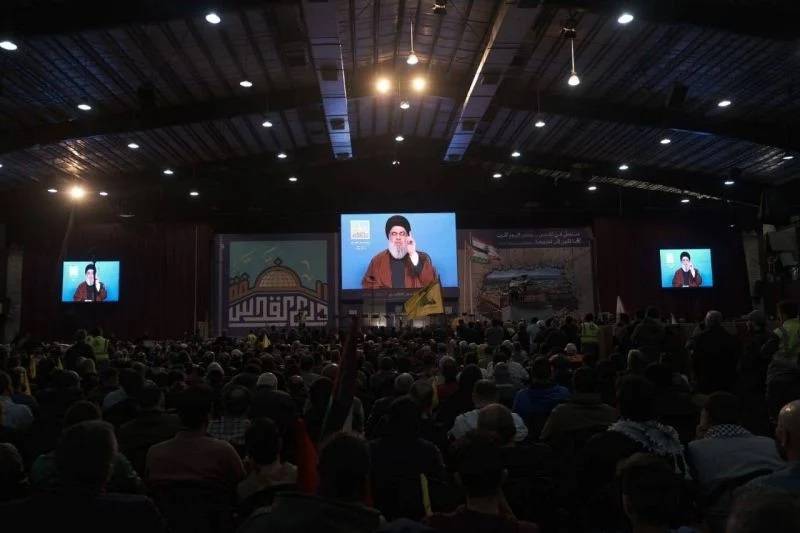
Hezbollah leader's speaks on April 14, 2023 in the southern suburbs of Beirut on the occasion of World Al-Quds Day. (Credit: João Sousa/L'Orient-Le Jour)
BEIRUT — A week after Israel launched retaliatory strikes on South Lebanon following a barrage of rockets fired across Lebanon' southern border, Hezbollah Secretary-General Hassan Nasrallah said Friday that "the policy of silence" regarding these events was "the best."
Nasrallah refrained in his last speech, on April 7, from commenting on the recent flareup between Lebanon and Israel, which increased border tensions to a level not seen since the 34-day war of 2006.
Hezbollah's leader made his remarks in a speech on the occasion of the Al-Quds Day (Jerusalem Day), decreed by Ayatollah Ruhollah Khomeini, leader of the Islamic Republic of Iran from 1979 to his death in 1989, and celebrated every year on the last Friday of Ramadan, the Muslim fasting month, in solidarity with the Palestinians.
"What happened on the southern border is an important and great event," Nasrallah said. "The policy of silence is the best in the war against the enemy. So there is no need for us to go into details."
"The policy of silence worries the enemy, but perhaps also the friends. But the concerns of friends can be dealt with. The enemy must remain worried and afraid. No one should give him assurances because he is the aggressor who attacks the Palestinian people every day, threatens the countries of the whole region, bombs Syria almost daily and threatens the Lebanese," he added.
On April 6, dozens of rockets were fired from Lebanon into Israeli territory. These rocket attacks came a day after Israeli police violently stormed the Al-Aqsa mosque — Islam's third holiest site — in Jerusalem to dislodge Palestinians who had barricaded themselves inside.
Israel responded to the rocket attacks at dawn on April 7 by striking South Lebanon. Israel also launched attacks on the Gaza Strip the same morning, also in response to rocket fire from the blockaded Palestinian enclave.
Israel has blamed the Palestinian Islamist movement Hamas for the incident on the Lebanese border, although to date no group has claimed responsibility for the rocket fire. Hamas's political bureau chief Ismail Haniyeh was in Beirut at the time.
On April 10, Israeli Prime Minister Benjamin Netanyahu assured that he would not "allow the terrorist Hamas to establish itself in Lebanon" and promised to "restore security" in his country by acting "on all fronts."
Many observers believe that rocket launches from Lebanon could not have taken place without Hezbollah's endorsement. The Shiite group is omnipresent in South Lebanon, and its leaders have recently advocated "unity of fronts" in their speeches.
On April 9, Hezbollah issued a statement saying that Nasrallah and Haniyeh had discussed the "state of readiness of the axis of resistance" against Israel.
Gebran Bassil, head of the Free Patriotic Movement and Christian ally of Hezbollah, criticized this "unity of the fronts" in a speech on April 13.